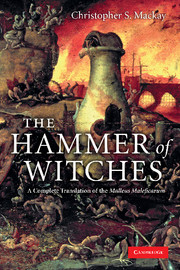Book contents
Question 18
from PART III
Published online by Cambridge University Press: 05 August 2015
Summary
NEXT, the treatment of those matters in which the secular judge can conduct the investigation and pass sentence by himself, while the ordinaries may remain unburdened if they wish. Not only is it our presupposition that we inquisitors are relieved of this burden without detriment to the Faith and justice, but it is also our desire that the bishops should enjoy the same propriety in being relieved. In this we are by no means eliminating their capacity and jurisdiction, but if they wish to use it, it would be necessary for us inquisitors to collaborate with them according to Chapter “Multorum querela” (“Heretics” in the Clementines). Let them note, however, that since the charge against sorceresses is not purely | ecclesiastical, temporal powers and lords are not forbidden to pass judgment and sentence, as is stated in Chapter “Ut Inquisitionis” § “Prohibemus” (Liber Sextus, “Heretics”). (He will in a similar manner determine in whose cases this power cannot pass the definitive sentence or conduct the investigation without the diocesans.)
First, it is necessary to look at the sentence in its own right, second, how it should be passed, and, third, how many methods there are by which it should be passed.
Regarding the first topic. According to Augustine, as is quoted in 2, Q. 1 [Decretum 2. 2. 1. 1], “We can pass sentence only on someone who has been convicted or has confessed unprompted,” and there are three kinds of sentence, “namely, interlocutory, definitive, and instructional,” as the Summary Gloss says at the beginning of the question. Raymund says in illustration of this, “‘Interlocutory sentence’ is the name for a sentence that is pronounced not on the main issue but on other questions that crop up between the beginning and end of the case, such as whether to debar a witness or whether or not to grant a delay and the like. Perhaps it is called interlocutory because it is pronounced by speaking among the parties without | the formality of writing.
- Type
- Chapter
- Information
- The Hammer of WitchesA Complete Translation of the Malleus Maleficarum, pp. 565 - 568Publisher: Cambridge University PressPrint publication year: 2009



